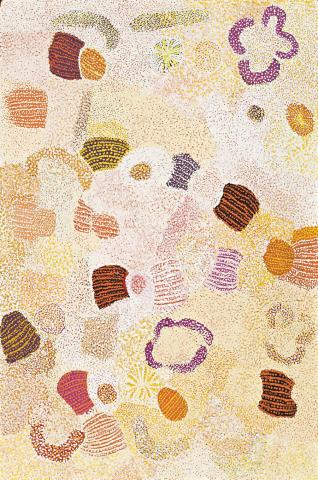PARWALLA, 2002
Elizabeth Nyumi Nungurrayi
synthetic polymer paint on linen
179.5 x 119.5 cm
inscribed verso: artist's name, size, Warlayirti Artists cat. 1021/01
Warlayirti Artists, Balgo Hills
Private collection, New South Wales
Biennale of Sydney 2004: On Reason and Emotion, Museum of Contemporary Art, Sydney, 4 June—15 August 2004 in accompanying exhibition catalogue, p. 164 (illus.)
Pawalla shows the abundance of Nyumi's country, the painting dense with luminous symbols representing traditional bush foods such as kantjilyi (bush raisin), pura (bush tomato), and minyili (seed). Women are represented as U shapes, with their wana (digging sticks) and coolamons. The many dominating white layers are referred to as kintikinti (close–close) which creates a rich texture that references the seeds of spinifex which grow abundantly after the rains.
In 2004, this painting was included in the Biennale of Sydney, On Reason and Emotion. Within the catalogue which accompanied the Biennale, senior curator Hetti Perkins described Nyumi's works as expressing 'more than a nostalgic yearning for the past. The arrangement of formal elements in her works articulates the physical connection of desert dwellers to their country. The act of painting Tjukurrpa as an expression of knowledge and creativity reveals a blueprint for physical survival and at the same time regenerates the transcendent energy of the Tjukurrpa. Thus, Nyumi's paintings afford an unequivocal understanding of the symbiotic relationship of Aboriginal people and country.'1
1. Perkins, H., ‘Elizabeth Nyumi Nungurrayi' in Carlos, I., (ed) Biennale of Sydney 2004: On Reason and Emotion, Biennale of Sydney, 2004, p. 162
